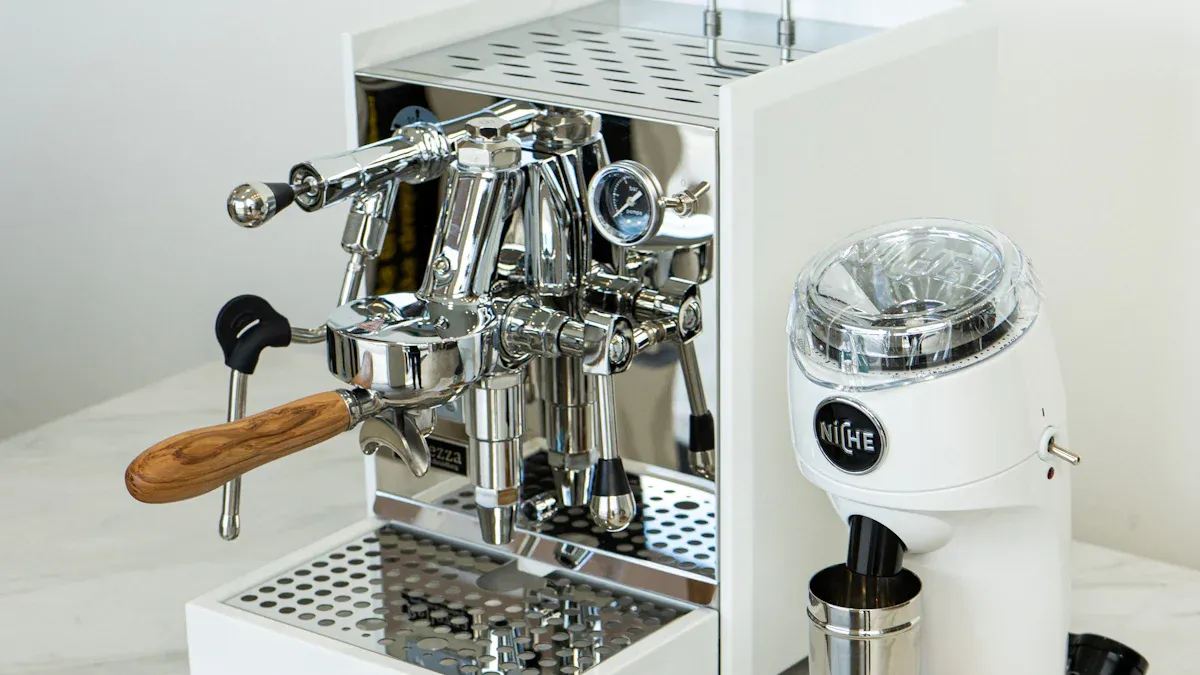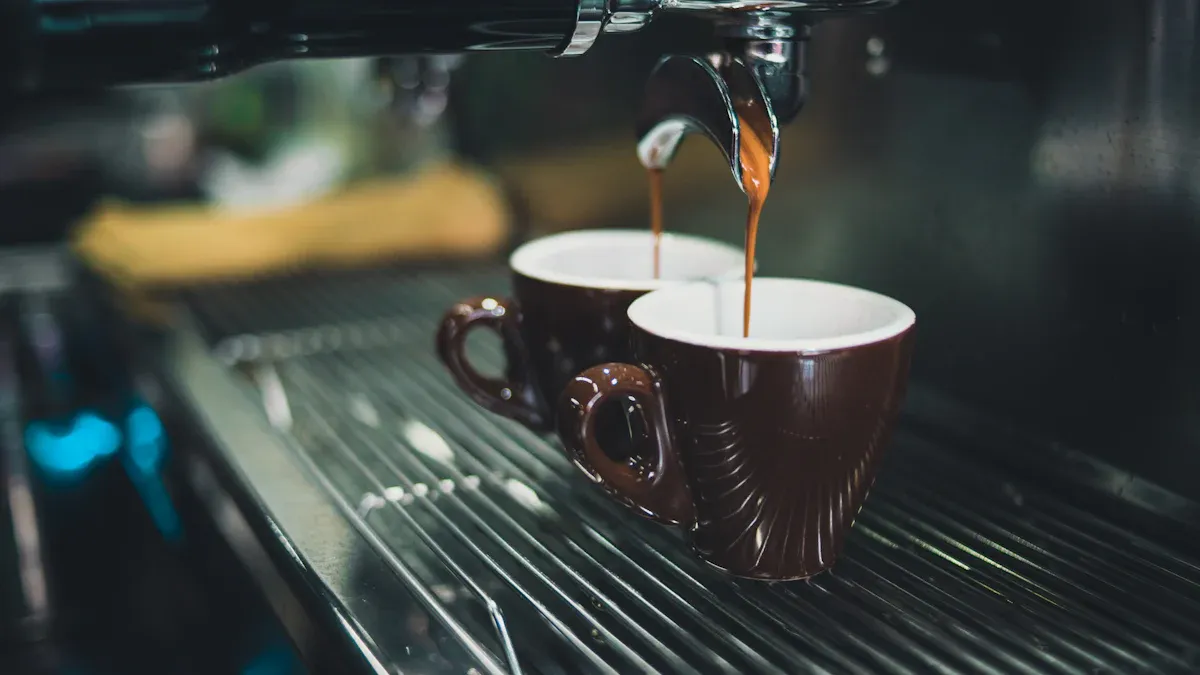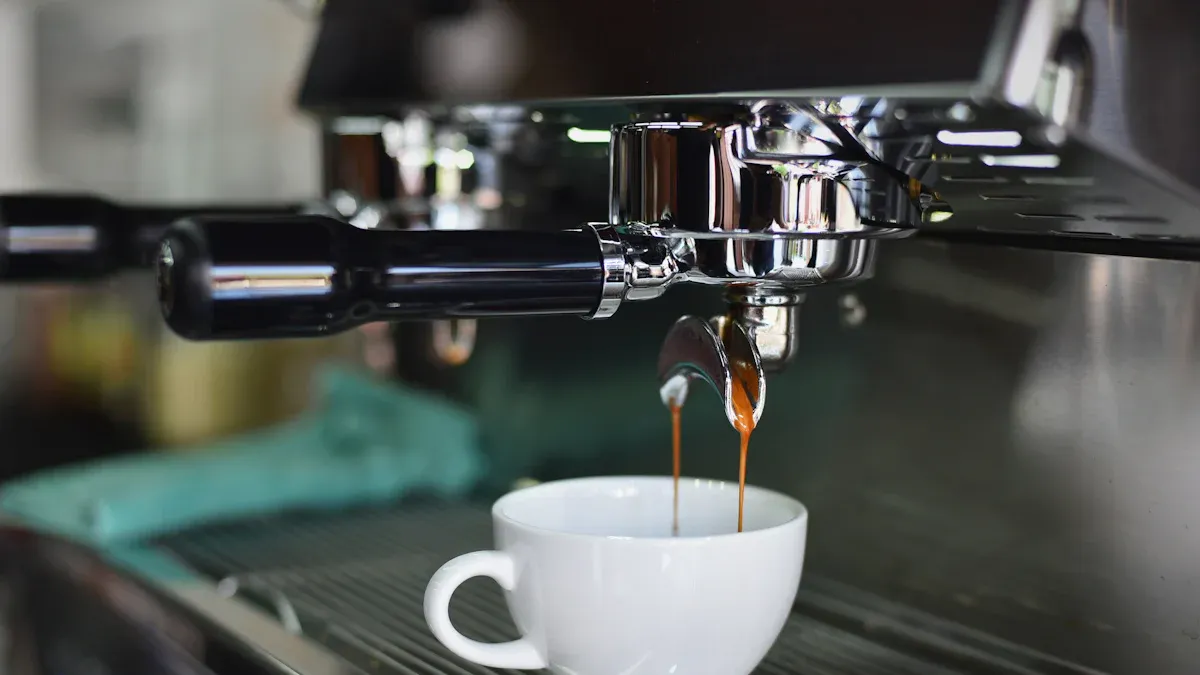
Accessing the European Union market requires meeting strict standards. The CE mark proves that products meet high safety, health, and environmental protection criteria. It enables manufacturers to legally sell their products across the EEA. By following these regulations, companies promote fair competition and gain consumer trust. For CE Certified Home Coffee Machines Wholesalers, understanding these technical requirements is crucial. It ensures they distribute machines that are safe, reliable, and compliant with EU laws. Prioritizing compliance not only protects consumers but also strengthens business credibility.
Key Takeaways
- CE certification is needed to sell coffee machines in the EU. It shows the products are safe and follow health rules.
- Wholesalers should buy from trusted makers to meet the rules. This helps avoid product recalls and fines.
- Clear labels make customers trust the product. Add important info like the maker’s name and safety tips on the labels.
- Knowing EU rules is very important. Use tools like EUDR Compliance Software to track changes and follow the rules.
- Working with experts makes certification easier. Their help prevents big mistakes and allows smooth selling in the market.
Understanding CE Certification
Definition and purpose
CE certification plays a vital role in ensuring product safety and compliance within the European market. It acts as a “passport” for products, allowing them to circulate freely across the European Economic Area (EEA). I see it as a way to simplify trade by adhering to a single set of standards. The CE mark signifies that a product meets the health, safety, and environmental protection requirements outlined in EU legislation.
To better understand its purpose, let’s look at the key elements manufacturers must document during the CE certification process:
| Element | Description |
|---|---|
| 1 | General description of the appliance |
| 2 | Conceptual design and manufacturing drawings and schemes of components, sub-assemblies, circuits, etc. |
| 3 | Descriptions and explanations necessary for the understanding of those drawings and schemes and the operation of the apparatus |
| 4 | A list of the harmonized standards applied in full or in part, published in the Official Journal of the European Union |
| 5 | Results of design calculations made, examinations carried out, etc. |
| 6 | Test reports |
This process ensures that products meet the required standards, making them safe for consumers and compliant with EU laws.
Legal obligations for EU market entry
Meeting CE certification requirements is not optional for manufacturers or wholesalers entering the EU market. I’ve learned that businesses must follow strict legal obligations to ensure compliance. These include maintaining detailed records, conducting audits, and adhering to harmonized standards.
Non-compliance can result in severe penalties. For example:
- Fines can reach up to €20 million or 4% of global annual turnover.
- Products may face bans or recalls, damaging a company’s reputation.
By fulfilling these obligations, businesses can avoid legal risks and ensure smooth market entry.
Benefits for wholesalers and consumers
CE certification benefits both wholesalers and consumers. For wholesalers, it opens doors to the $16.6 trillion GDP European market, enabling free movement of products without additional regulatory hurdles. It also provides a competitive edge, as CE-marked products often attract more buyers due to their compliance with recognized standards.
For consumers, the CE mark guarantees safety and quality. It protects them from hazardous materials and ensures that products meet stringent safety requirements. This builds trust and enhances brand reputation, which ultimately benefits everyone involved.
Tip: Distributing CE-certified products not only ensures compliance but also strengthens customer loyalty and boosts sales.
Technical Specifications for CE-Certified Coffee Machines

Electrical safety and overheating protection
Electrical safety is a cornerstone of CE certification for home coffee machines. I always look for machines that comply with internationally recognized standards to ensure safe operation. These standards address critical aspects like temperature control and overheating protection.
| Standard | Description |
|---|---|
| UL 1082 | Household Electric Coffee Machine Standard |
| UL 197 | Commercial Electric Coffee Machine Standard |
| UL 60730-2-9 | Temperature Sensing Control Standard |
| IEC 60335-2-15 | Household Electric Coffee Machine Standard |
These benchmarks ensure that coffee machines operate safely under normal conditions and prevent hazards like electrical shocks or overheating. For wholesalers, sourcing machines that meet these standards is essential. It guarantees compliance and builds trust with consumers who prioritize safety.
Energy efficiency standards
Energy efficiency is another critical factor for CE-certified coffee machines. I’ve noticed that energy-efficient models not only reduce electricity consumption but also align with eco-labeling criteria. Several standards validate energy performance:
| Standard | Description |
|---|---|
| EN 13248: 2002 | Focuses on eco-label criteria for commercial coffee machines used at home. |
| RAL –UZ 136 | Covers eco-labeling for various coffee machine types in Germany. |
| EURO-TOPTEN | Measures total energy consumption based on typical usage. |
| FEA/CECED | Swiss energy labeling program for espresso machines. |
Energy usage varies depending on the type of machine:
- Household coffee machines typically consume 500–1500 W.
- Vending machines range from 1000–5000 W.
- Traditional coffee instruments can use up to 9000 W.
By choosing energy-efficient models, wholesalers can appeal to environmentally conscious consumers while reducing operational costs.
Material compliance (e.g., food-grade materials, RoHS)
Material compliance is vital for CE-certified coffee machines. I always ensure that the machines I source use food-grade materials to guarantee safety during coffee preparation. Compliance with the Restriction of Hazardous Substances (RoHS) directive is equally important. This directive limits the use of harmful substances like lead and mercury in electronic devices.
Food-grade materials prevent contamination and ensure the coffee’s quality remains uncompromised. RoHS compliance, on the other hand, minimizes environmental impact and supports sustainable practices. Wholesalers distributing CE-certified home coffee machines benefit from these standards by offering products that are safe, eco-friendly, and appealing to health-conscious consumers.
Noise and environmental impact considerations.
Noise levels play a significant role in the overall user experience of home coffee machines. I always recommend choosing machines that operate quietly, especially for residential use. Excessive noise can disrupt the peaceful atmosphere of a home or office. CE-certified coffee machines often meet strict noise level standards, ensuring they remain unobtrusive during operation. Manufacturers achieve this by incorporating advanced insulation and vibration-dampening technologies. For wholesalers, offering quieter models can appeal to customers who prioritize comfort and convenience.
Environmental impact is another critical factor. I’ve noticed that eco-conscious consumers increasingly prefer products with sustainable features. CE-certified coffee machines often comply with environmental regulations, such as the EU’s Ecodesign Directive. This ensures that the machines are energy-efficient and have a reduced carbon footprint. Many models also feature recyclable components and minimal packaging, which further supports sustainability goals.
When sourcing products, I always look for machines that balance performance with environmental responsibility. For example, some models include energy-saving modes that automatically power down when not in use. Others use biodegradable materials for certain parts, reducing waste. These features not only benefit the planet but also enhance the appeal of the product to environmentally aware buyers.
For CE Certified Home Coffee Machines Wholesalers, understanding these aspects is essential. By offering machines that are quiet and eco-friendly, wholesalers can meet the demands of modern consumers while staying compliant with EU regulations.
Tip: Highlighting noise reduction and eco-friendly features in your product listings can attract a broader customer base and boost sales.
Documentation and Labeling for Compliance
CE marking process and placement
The CE marking process ensures that products meet EU safety, health, and environmental standards. I always emphasize the importance of following this process carefully. Manufacturers must conduct a conformity assessment to verify compliance with relevant directives. Once the product passes, they can affix the CE mark. This mark must be visible, legible, and permanently attached to the product or its packaging.
Placement of the CE mark is equally important. It should appear on the product itself whenever possible. If that’s not feasible, it can go on the packaging or accompanying documentation. The mark must follow specific design guidelines, including proportions and spacing, to avoid misrepresentation. For CE Certified Home Coffee Machines Wholesalers, ensuring proper placement of the CE mark is critical. It demonstrates compliance and builds trust with both regulators and consumers.
Required technical documentation
Technical documentation serves as proof that a product complies with EU regulations. I always recommend maintaining detailed and organized records. This documentation typically includes design drawings, test reports, and a declaration of conformity. It also outlines the manufacturing process and lists the standards applied during production.
Wholesalers should ensure that manufacturers provide complete technical files. These files must remain accessible for at least ten years after the product’s release. Incomplete or missing documentation can lead to penalties or product recalls. By prioritizing proper documentation, wholesalers can avoid compliance issues and ensure smooth operations in the EU market.
Accurate labeling for consumer trust
Accurate labeling plays a vital role in building consumer confidence. I’ve noticed that consumers rely on labels to make informed purchasing decisions, especially for specialty appliances like coffee machines. Labels should include essential details such as the manufacturer’s name, product model, and safety instructions. Clear and compliant labeling not only meets regulatory requirements but also fosters trust and repeat business.
Adhering to labeling guidelines helps manufacturers provide accurate information. This reduces the risk of regulatory actions or product recalls, which can harm a brand’s reputation. I’ve also observed a growing demand for detailed labeling. Consumers want clarity, and meeting this demand enhances a product’s appeal. For CE Certified Home Coffee Machines Wholesalers, offering well-labeled products ensures compliance and strengthens customer relationships.
Tip: Highlighting accurate and compliant labeling in your product descriptions can attract more buyers and boost sales.
Practical Tips for CE Certified Home Coffee Machines Wholesalers

Sourcing from reliable manufacturers
Finding reliable manufacturers is the first step to ensuring compliance with EU standards. I always recommend verifying suppliers through established certification bodies. This guarantees that the coffee machines meet CE certification requirements and maintain consistent quality. Reliable manufacturers often undergo rigorous audits and adhere to strict contractual agreements before certification.
| Certification Body | Description |
|---|---|
| UL Verification Services Inc. | Conducts Supplier Quality Audits & Certification (SQAC) for impartial assessments. |
| UL Environment | Operates accredited schemes with detailed agreements for manufacturers. |
Partnering with manufacturers who follow these protocols ensures that the products you distribute are safe, durable, and compliant. It also minimizes risks associated with non-compliance, such as recalls or fines.
Understanding testing and certification
Testing and certification are critical for CE compliance. I always ensure that the coffee machines I source have undergone proper conformity assessments. These assessments include testing, calibration, and inspection to verify that the products meet EU standards. Accreditation plays a key role in this process, as it confirms the competence and impartiality of testing bodies.
| Aspect | Description |
|---|---|
| Accreditation Definition | Third-party attestation of competence, impartiality, and consistent operation in conformity assessment activities. |
| Conformity Assessment Activities | Includes testing, calibration, inspection, certification of management systems, products, and services. |
| Regulatory Framework | Governed by Regulation (EC) No 765/2008, which sets requirements for accreditation and market surveillance. |
| National Accreditation Bodies | Each EU member state has one national AB responsible for accrediting CABs, whether mandatory or voluntary. |
| Legal Status of National ABs | Member states can establish a public authority or entrust a private organization with accreditation responsibilities. |
Understanding these procedures helps wholesalers ensure that the products they distribute are fully compliant and ready for the EU market.
Staying updated on EU regulations
EU regulations evolve frequently, and staying informed is essential for wholesalers. I recommend using tools like the EUDR Compliance Software, which helps monitor regulatory updates and ensures traceability. This software enhances compliance by collecting data and conducting risk assessments.
- The EUDR emphasizes traceability and sustainable practices, which are crucial for market access.
- Many coffee products fail to meet traceability requirements, creating challenges for wholesalers.
- Smallholder farmers often face barriers in meeting these standards, which can impact supply chains.
By staying updated, wholesalers can adapt to regulatory changes and maintain smooth operations. This proactive approach not only ensures compliance but also strengthens relationships with manufacturers and consumers.
Tip: Regularly review EU directives and collaborate with compliance experts to stay ahead of regulatory changes.
Collaborating with compliance experts.
Navigating the complexities of CE certification can feel overwhelming. I’ve found that collaborating with compliance experts simplifies the process and ensures accuracy. These professionals specialize in EU regulations and provide valuable guidance for CE Certified Home Coffee Machines Wholesalers. Their expertise helps businesses avoid costly mistakes and ensures products meet all necessary standards.
One of the key benefits of working with compliance experts is their ability to conduct thorough audits. They review technical documentation, assess product designs, and identify potential compliance gaps. This proactive approach minimizes risks and ensures smooth market entry. I always recommend scheduling regular consultations with these experts to stay ahead of regulatory changes.
Compliance experts also assist with testing and certification. They work closely with accredited testing bodies to verify that coffee machines meet EU safety, health, and environmental requirements. Their involvement streamlines the certification process and reduces the likelihood of delays. For wholesalers, this means faster access to the European market and increased customer trust.
Another advantage of collaborating with compliance experts is their role in training teams. They educate staff on CE certification requirements, ensuring everyone understands their responsibilities. This knowledge empowers wholesalers to maintain compliance and respond effectively to regulatory updates. I’ve seen how this training improves operational efficiency and strengthens business credibility.
Tip: Partnering with compliance experts not only ensures regulatory compliance but also enhances your reputation as a reliable distributor. This collaboration is an investment in long-term success.
By leveraging the expertise of compliance professionals, CE Certified Home Coffee Machines Wholesalers can confidently navigate the EU market. This partnership ensures products meet the highest standards, benefiting both businesses and consumers.
CE certification is essential for accessing the European market. It ensures that coffee machines meet safety, health, and environmental standards. I’ve seen how this compliance builds trust and opens doors to the EEA. Wholesalers must focus on key requirements like electrical safety, energy efficiency, and proper labeling.
Key Benefits of CE Certification:
- Guarantees compliance with EU safety and quality standards.
- Enhances consumer protection and confidence.
- Facilitates smooth market entry and fair competition.
By prioritizing CE-certified products, wholesalers can strengthen their reputation and meet the growing demand for reliable, eco-friendly coffee machines.
FAQ
What does the CE mark signify on a coffee machine?
The CE mark shows that the coffee machine meets EU safety, health, and environmental standards. It allows the product to be sold legally within the European Economic Area (EEA). This mark ensures compliance with EU regulations and builds consumer trust.
How can I verify if a coffee machine is CE certified?
You can check the product’s technical documentation, which includes the Declaration of Conformity. This document lists the EU directives and standards the product complies with. Always source from manufacturers who provide complete and accurate certification records.
Are CE-certified coffee machines more expensive?
Not necessarily. While CE-certified machines may involve additional testing and compliance costs, they often provide better safety and quality. These features can lead to long-term savings by reducing risks of recalls, fines, or customer dissatisfaction.
Do CE-certified coffee machines meet energy efficiency standards?
Yes, CE-certified machines must comply with EU energy efficiency directives. These standards ensure reduced energy consumption and environmental impact. Look for models with energy-saving features like automatic power-off modes to appeal to eco-conscious consumers.
Is CE certification mandatory for all coffee machines sold in the EU?
Yes, CE certification is required for all coffee machines sold in the EU. It ensures compliance with essential safety and environmental regulations. Without this certification, products cannot legally enter the EU market.
Tip: Always verify CE compliance before distributing coffee machines to avoid legal and financial risks.
Post time: Apr-10-2025
